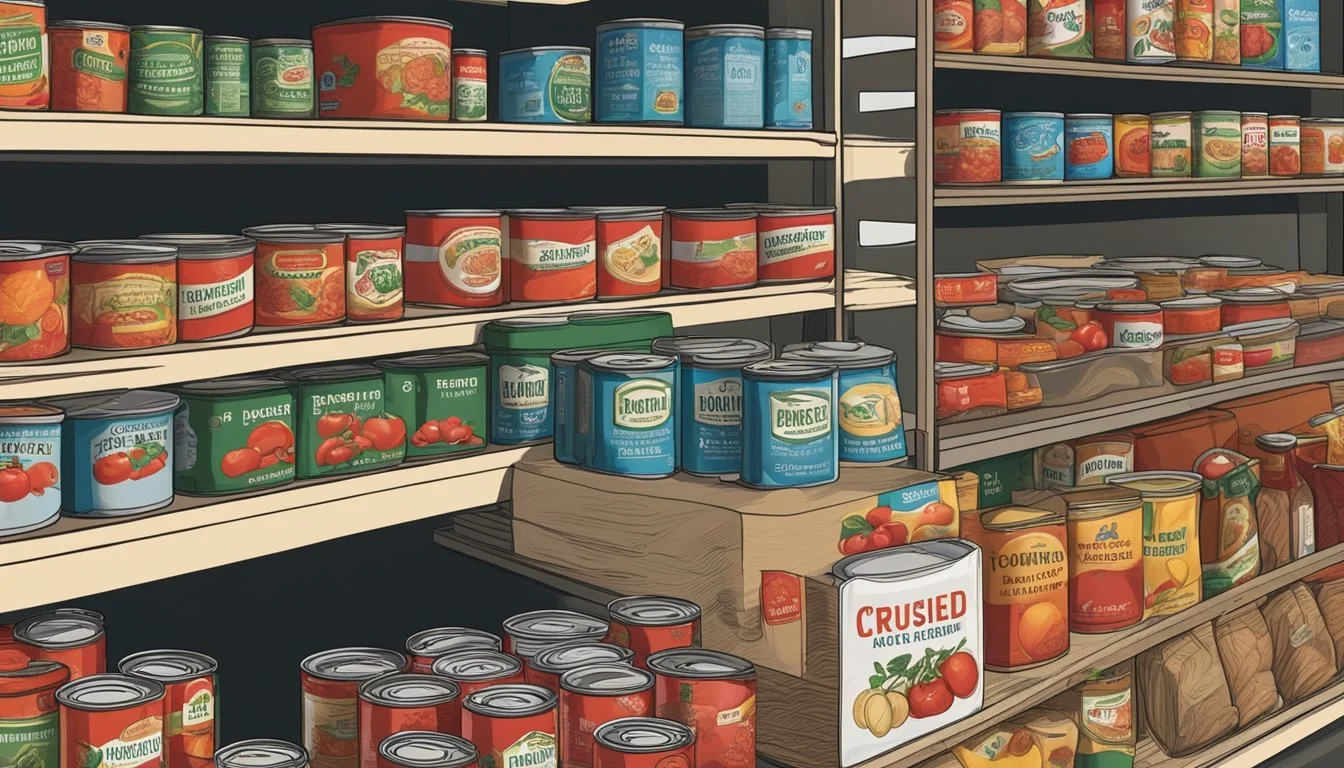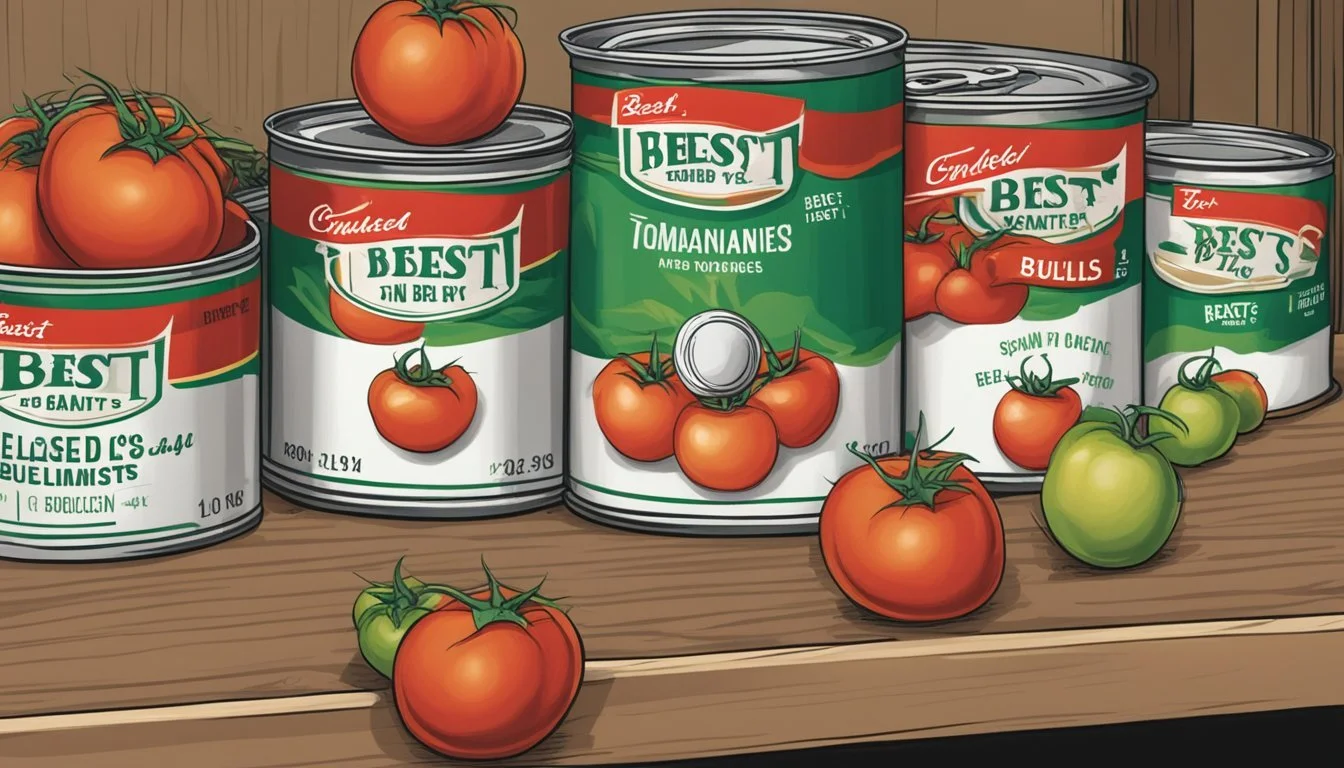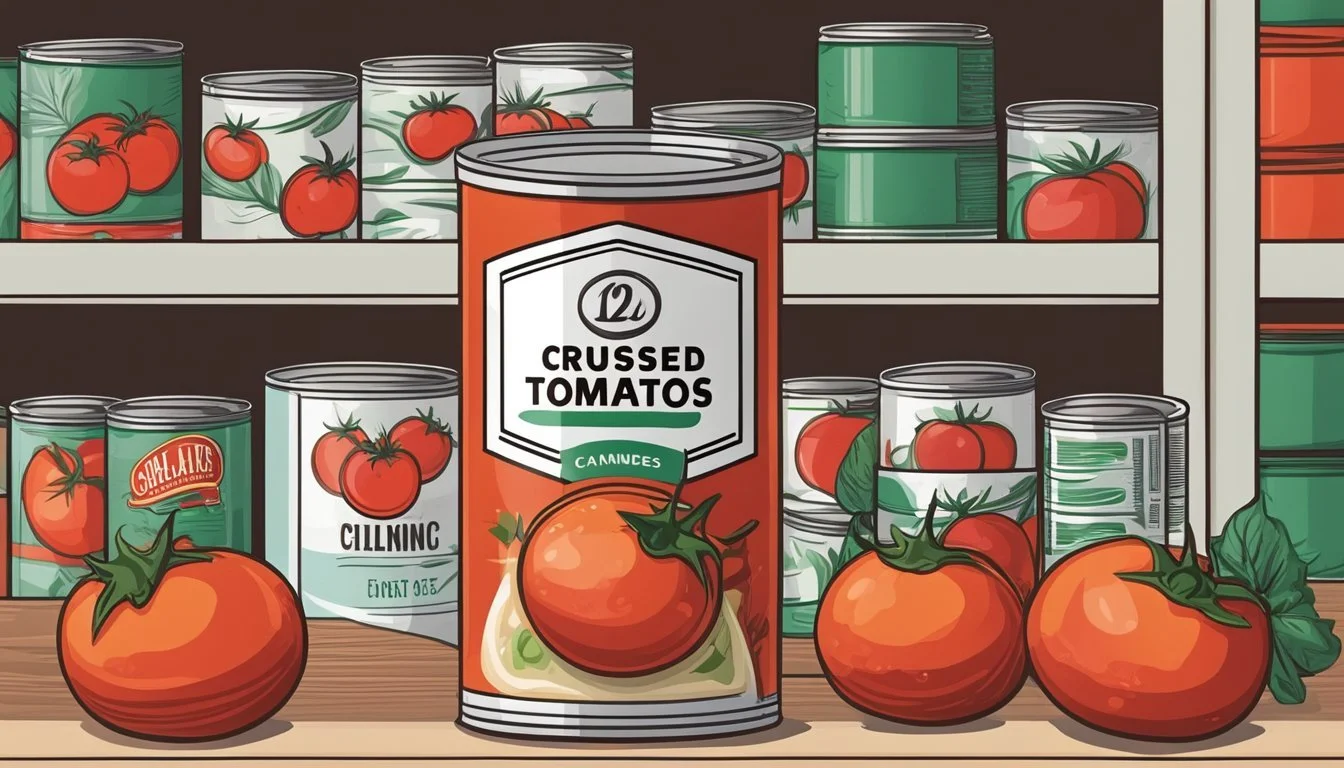Do Crushed Canned Tomatoes Expire?
Shelf Life and Storage Tips
Crushed canned tomatoes are a pantry staple, known for their versatility and rich flavor. These tomatoes add depth to many dishes, making them an essential ingredient for home cooks. Unopened crushed canned tomatoes typically maintain their best quality for about 12 to 18 months, although they can remain safe to consume for much longer if stored properly.
The canning process involves sealing tomatoes in airtight containers and heating them to eliminate bacteria and enzymes that could cause spoilage. This process helps extend the shelf life of crushed canned tomatoes, ensuring they remain safe to use. However, the flavor and texture may gradually decline over time.
It's crucial to inspect the can for any signs of damage such as dents, rust, or swelling before use. Any of these issues could indicate spoilage and render the contents unsafe to eat. Once opened, transfer the tomatoes to an airtight container, refrigerate, and consume within 3-4 days to enjoy the full flavor and quality.
Understanding Canned Tomatoes
Canned tomatoes, a common pantry staple, offer both convenience and nutritional value. They serve vital roles in various recipes, enhancing dishes with their rich flavor and versatility.
Canning Process and Types
Canned tomatoes undergo a process that seals them in airtight containers and heats them to destroy bacteria, enzymes, and other microorganisms. This ensures long shelf stability. Types of canned tomatoes include:
Crushed Tomatoes: Ideal for sauces and soups.
Diced Tomatoes: Commonly used in stews and casseroles.
Whole Peeled Tomatoes: Versatile; can be cut or crushed as needed.
Stewed Tomatoes: Often seasoned, perfect for quick recipes.
Tomato Paste and Purée: Concentrated, offering intense tomato flavor.
Nutritional Profile
Canned tomatoes are rich in nutrients and antioxidants. They contain:
Vitamins: High in vitamins A and C.
Nutrients: Provide a good source of potassium and B-vitamins.
Antioxidants: A notable amount of lycopene, which may help reduce cancer risk.
The canning process generally preserves these nutrients, making canned tomatoes a healthy addition to meals.
Role in Cooking
Canned tomatoes enhance a variety of dishes:
Soups and Stews: Provide body and flavor.
Sauces: Serve as a base for marinara or meat sauces.
Versatile Ingredient: Can be used in countless recipes, from chili to casseroles.
Their convenience and long shelf life make them a reliable ingredient for both quick and slow-cooked meals.
Shelf Life and Expiration
The shelf life of crushed canned tomatoes depends on several factors, including storage conditions and packaging integrity. Identifying expiration dates and recognizing signs of deterioration are crucial for ensuring safety and quality.
Identifying Expiration Dates
Expiration dates are typically printed on the can and provide an estimate of the product’s shelf life. You'll often see terms like use-by, best-by, or expiration date. These dates help consumers gauge the freshness and safety of the product.
An unopened can of tomatoes, when stored in a cool, dry place, can last anywhere from 1 to 2 years. Ensuring that cans are kept away from direct sunlight and extreme temperatures can extend longevity. Once opened, transferring tomatoes to an airtight container and storing in the refrigerator is essential to maintain their quality for about 5-7 days.
Signs of Deterioration
Several signs indicate that canned tomatoes have deteriorated and may no longer be safe to eat. Texture and taste changes are key indicators. Fresh tomatoes should have a consistent texture, while a deteriorated product may become slimy or mushy.
Color and odor offer additional clues. A good can of tomatoes will retain its vibrant red color and have a fresh, tomato-like smell. If there is any discoloration or off-odor, it’s best to discard the product.
Physical damage to the can, such as bulging, swelling, rust, or leaking, is a strong sign the tomatoes might be compromised. Always inspect the cans before use to avoid foodborne illnesses.
Factors Affecting Shelf Life
The shelf life of canned tomatoes is influenced by several factors including storage conditions and packaging. Storing cans in a cool, dry place away from direct sunlight is critical. Temperature fluctuations can accelerate deterioration.
Once a can is opened, transferring the contents to an airtight container and refrigerating is crucial for prolonging freshness. Exposure to air increases the risk of spoilage. For longer storage, placing the airtight container in a freezer-safe option can extend usability up to 3-4 months, although this may slightly affect texture after thawing.
Proper storage and regular inspection ensure crushed canned tomatoes remain safe and flavorful as long as possible.
Safety and Spoilage
Crushed canned tomatoes, like all canned foods, require proper handling to ensure they remain safe to eat. This part covers how to identify spoiled tomatoes and prevent foodborne illness.
Recognizing Spoilage
Identifying spoiled canned tomatoes is crucial for preventing foodborne illness. Visible signs include mold, unusual odor, and discoloration.
Additionally, cans that are leaking, bulging, or rusted should be discarded immediately. If the tomatoes have a foul smell upon opening, it's a clear sign of spoilage.
Inspecting canned goods is vital to avoid food poisoning from pathogens like salmonella or botulism. Always check the conditions of the can and the contents before consumption.
Preventing Foodborne Illness
Proper storage is essential to keep crushed canned tomatoes safe. Store unopened cans in a cool, dry place, ideally between 50-75 degrees Fahrenheit. Avoid exposing cans to temperatures above 100 degrees, which can compromise the seal.
After opening, transfer leftovers to a sealed container and refrigerate. Use opened tomatoes within 5 to 7 days to prevent spoilage. Following these storage tips reduces the risk of foodborne illnesses and food waste.
Implementing these practices helps maintain the safety of canned tomatoes and protects against harmful bacteria.
Post-Opening Handling
Proper handling of opened canned tomatoes is crucial to maintain their freshness and safety. Storage methods and understanding their shelf life can help ensure quality and prevent spoilage.
Storage After Opening
Once a can of tomatoes is opened, transferring the contents to a clean, airtight container is essential. Airtight containers help protect the tomatoes from air exposure, which can lead to spoilage or contamination.
Store the sealed container in the refrigerator. It's important to maintain consistent refrigeration to preserve both flavor and texture. Not doing so can result in loss of liquid and the degradation of the tomatoes. Ensuring minimal headspace in the container can also help in maintaining freshness.
Shelf Life After Opening
The shelf life of opened canned tomatoes typically ranges from 5-7 days when stored correctly in an airtight container in the refrigerator. It's important to regularly check the tomatoes for signs of spoilage, such as off smells, mold, or changes in texture.
Always use judgment; if the tomatoes develop an unusual appearance or odor, it's best to discard them. Proper storage and being mindful of the shelf life can extend the usability and safety of your opened canned tomatoes.
Optimizing Tomato Use
To make the most out of canned tomatoes, it’s essential to consider both their nutritional value and how to effectively integrate them into various recipes.
Maximizing Nutritional Benefits
Canned tomatoes retain high nutritional content due to the canning process, which preserves vitamins and antioxidants. Lycopene, an antioxidant found in tomatoes, is more readily absorbed from cooked tomatoes than fresh ones. Cooking and canning increase its availability, making canned tomatoes an excellent source.
Storing unopened cans in cool, dry places ensures longevity. Once opened, transfer the tomatoes to an airtight container and refrigerate, using them within 5-7 days. This practice maintains their freshness and nutritional quality, preventing spoilage and waste.
Incorporating Into Dishes
Canned tomatoes are versatile and convenient, fitting seamlessly into many recipes. They work well in sauces, soups, and stews, enhancing flavors with their rich and robust taste. Crushing or blending them can create a smooth base for pasta sauces or salsas.
In stews, canned tomatoes contribute to a deeper flavor profile, melding with other ingredients. They also pair perfectly with vegetables and proteins, transforming simple dishes into hearty meals. Keeping a few cans in the pantry means having an instant ingredient ready for quick and nutritious cooking.
Experiment with different recipes to discover how well canned tomatoes can adapt and elevate various culinary creations.
Choosing Quality Canned Tomatoes
Selecting high-quality canned tomatoes ensures not only better taste but also nutritional value. Key considerations include inspecting the can's integrity and understanding the labeling for manufacturer details and added ingredients.
Inspecting Canned Goods
When choosing canned tomatoes, inspect the can for any dents, rust, or bulging. These signs can indicate compromised integrity which might affect the safety and quality of the contents. Dented or rusty cans can signify potential breaches in the seal, allowing bacteria to enter.
Hold the can and check for unusual swelling or puffiness, which could be a sign of spoilage. Additionally, listen for any hissing sound when opening, which could suggest the presence of gas produced by bacterial activity. The overall appearance is crucial to ensuring the canned goods are safe to consume.
Understanding Labeling and Brands
Reading the label is essential for identifying quality canned tomatoes. Look for information about the variety of tomatoes used, whether they are whole peeled, diced, crushed, stewed, or purée. Labels should also list whether there are any added sugars or preservatives, which can affect the healthiness of the product.
Reputable food manufacturers often provide more transparent information about their products. Opt for brands known for high standards and good manufacturing practices. Checking the expiration date is also essential; while canned tomatoes generally have a shelf life of 18 to 24 months, consuming them within this time frame ensures the best flavor and nutrient retention.





